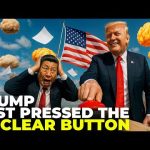Recently, the world was shaken by a significant development concerning nuclear weapons testing. President Trump raised the idea of resuming nuclear weapons tests in the United States for the first time since 1992, which has prompted a strong response from Russia. The Kremlin made it clear that they will adjust its nuclear strategy based on what other nations decide to do with their arms. This situation raises the stakes for everyone involved and highlights the tense military climate between global powers.
Retired four-star General Jack Keane provided insights on this matter, revealing that there has been long-standing speculation about whether nations like Russia and China are secretly advancing their nuclear capabilities. While it remains unclear whether they are indeed conducting secret tests, it’s undeniable that the President has access to classified information that sheds light on these activities. The urgency behind Trump’s declaration might stem from Russia’s recent announcement regarding its testing of potential delivery systems for nuclear weapons, which includes advanced technologies like underwater drones.
General Keane noted that President Trump is motivated by the desire to reduce nuclear arsenals rather than escalate tensions. He seeks to bring both China and Russia to the negotiating table, though it appears that China has not been participating in good faith. Meanwhile, Russia continues to bolster its nuclear armament, particularly in the realm of tactical nuclear weapons. The complex interplay of military strategies underscores a broader battle for global influence, and many are eagerly awaiting the next steps in this high-stakes game.
In a further twist to this saga, the President’s recent efforts to strengthen alliances in Asia have garnered positive feedback. His meetings with allies like Japan and South Korea have resulted in commitments to ramp up defense spending. By establishing strong partnerships in the region, Trump aims to position the U.S. as a formidable global leader, all while facing nations like China, which has long sought to replace America at the top. The coalition is critical, especially with China’s ties to countries like Iran, which is also working to enhance its missile programs.
Additionally, President Trump is contemplating military actions in Venezuela, where he has stressed the importance of showing American military strength. The deployment of an aircraft carrier to the region signifies more than just a show of force; it represents a strategic move against the Maduro regime, which has close ties to drug trafficking operations. The President aims to put pressure on Maduro’s supporters, highlighting the financial ramifications of continuing to back a regime that is viewed as detrimental to regional stability.
In conclusion, President Trump’s approach to nuclear arms and foreign relations has kicked off a new chapter in international politics. With notable shifts in alliances, potential military actions, and an ever-changing landscape of nuclear capabilities, the world is watching closely. While challenges remain, the administration’s focus on de-escalation and fostering alliances could lead to significant outcomes in the coming months. With so many players involved, it’s safe to say that the game is far from over, and the stakes could not be higher.




